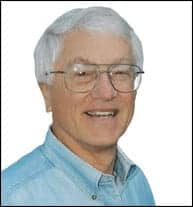Caption: Kern Wildenthal (left) received the 2017 Ruth and Ken Altshuler Callier Care Award from Ken Altshuler (center) and Tom Campbell at the sixth annual Callier Cares Luncheon.
Supporters, patients, and partners of the Callier Center for Communication Disorders came together to share stories, honor award recipients, and raise funds during the sixth annual Callier Cares Luncheon, the University of Texas at Dallas announced on its website.
Through the leadership of luncheon chair Emilynn Wilson and honorary chair Lisa Troutt, the event raised more than $280,000 to benefit patients in need with speech, language, and hearing disorders through the Callier Care Fund. The fund, established by Ruth and Ken Altshuler, provides treatment for children and adults who would otherwise be unable to afford care, according to the announcement.
Kern Wildenthal, president emeritus and professor emeritus of medicine at UT Southwestern, received the 2017 Ruth and Ken Altshuler Callier Care Award. The award is presented annually to an individual or group who has contributed significantly to the betterment of the community and to advancing the care of patients with communication disorders.
Wildenthal, who also serves as a consultant for Children’s Health System of Texas and past president of Children’s Medical Center Foundation, nurtured the relationship between UT Southwestern and the Callier Center that led to partnerships, including the Callier Child Development Program, the Cochlear Implant Program, and a program that evaluates and treats children with autism.
“What Callier stands for in the community is really remarkable—absolutely first-rate clinical care, research, and teaching, and absolutely first-rate community spirit,” Wildenthal said. “It’s a great honor to be associated with Callier through this award.”
Sharon Kujawa, an associate professor of otology and laryngology at Harvard Medical School, received the 2017 Callier Prize in Communication Disorders. The biennial award recognizes individuals for their leadership in fostering scientific advances and significant developments in the diagnosis and treatment of communication disorders.
Kujawa, who also is the director of audiology research and a senior scientist at Eaton-Peabody Laboratories at Massachusetts Eye and Ear Hospital in Boston, studies how aging and noise exposure can affect hearing. Her recent research on hidden hearing loss has initiated what is widely regarded as a paradigm shift in the way noise-induced and age-related hearing loss and inner ear injury is assessed.
“I am so honored to be the recipient of this award,” Kujawa said. “The Callier Center has long been a leader in clinical training and research, and clinical care in the communication sciences and disorders. So it’s especially gratifying that this award comes from this prestigious center.”
Featured speaker Richard Neely expressed gratitude for his family, friends, and those at Callier who encouraged him as he battled profound hearing loss. Neely received his first pair of hearing aids at age 7. He also learned to lip read and used assistive hearing devices.
By the time he turned 50, his hearing comprehension had deteriorated to 15 percent. Through the counsel of Ross Roeser, executive director emeritus of the Callier Center, Neely decided to get cochlear implants.
“Wow! The first day of activation was a new world of hearing,” Neely said. “I complained to Kathleen [Neely’s wife] that she was crinkling the newspaper. Then, I discovered the sound of water running in the pipes and the noise of air conditioning coming on.”
Today, he serves as emeritus trustee for the Foundation for the Callier Center.
“What a great opportunity to help Callier and learn more about it, especially Callier’s focus on autism,” Neely said.
A video highlighted the stories of patients, including 4-year-old Brock Burson and his experience in Callier’s Early CLASS, a classroom-based speech, language, and communication program for children with autism spectrum disorder and their parents.
“It’s almost impossible to quantify the value of having a clinician per child in a structured classroom with a limited attendance,” said Dustin Burson, Brock’s father. “This clinic, this building, this area is an absolute blessing to the Dallas community.”
The seventh annual Callier Cares luncheon will be held April 17, 2018. To contribute to the Callier Care Fund, visit: utdallas.edu/calliercenter/give.
Source: University of Texas at Dallas
Images: University of Texas at Dallas





